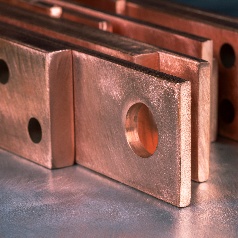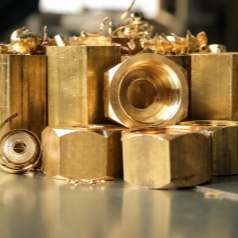


What is the Difference Between Copper, Brass, and Bronze?
Copper, brass, and bronze are all popular alloy materials with distinct characteristics. Here's a breakdown:
Copper: A pure element, copper is known for its excellent electrical conductivity, corrosion resistance, and malleability. It’s often used in wiring, plumbing, and roofing materials.
Brass: An alloy made from copper and zinc, brass has a bright yellow appearance. It's commonly used in decorative items, musical instruments, and fittings due to its workability and resistance to corrosion.
Bronze: An alloy primarily of copper and tin, bronze is harder than both copper and brass. It has a reddish-brown color and is often used in industrial applications, marine environments, and sculptures because of its strength and corrosion resistance.
Each material has its own unique properties and is suitable for different applications depending on the requirements for strength, durability, and appearance.
How to Tell Copper from Brass or Bronze?
It can be tricky to differentiate between copper, brass, and bronze, especially to the untrained eye. Here are some key ways to identify them:
Color:
Copper has a reddish-brown hue.
Brass tends to be more yellow or gold.
Bronze is darker, with a reddish-brown or dark brown appearance.
Magnet Test: None of these metals are magnetic. If a magnet sticks, you're likely dealing with a different metal, possibly iron or steel.
Sound Test: When struck, brass produces a clear ringing sound, while bronze has a deeper, more muted ring. Copper produces a softer sound when tapped.
Pro Tip: If you're unsure, consider performing a metal analysis test or consult an expert.
Which is Better: Copper, Brass, or Bronze?
The answer depends on your specific needs:
Copper: Ideal for electrical applications and plumbing due to its high conductivity and flexibility. It’s also more corrosion-resistant than brass but more expensive.
Brass: A more affordable option, brass is easier to work with and has a more decorative appeal. It’s suitable for low-friction applications like locks and gears, as well as decorative fittings.
Bronze: If strength and durability are your primary concerns, especially in environments exposed to seawater or heavy wear, bronze is the best option. It’s more expensive but offers superior strength and corrosion resistance.
Case Study: In marine environments, bronze is often favored for propellers and underwater fittings because of its resistance to saltwater corrosion, whereas brass is commonly used for lower-stress decorative applications like door handles.
Copper, Brass, Bronze Common Grades
Each of these materials comes in various grades, offering specific properties suited to different applications:
Copper Grades:
C110 (Electrolytic Tough Pitch Copper): High conductivity, ideal for electrical components.
C122 (DHP Copper): Commonly used for plumbing and tubing.
Brass Grades:
C260 (Cartridge Brass): Known for its good formability and strength, often used in ammunition casings and radiator cores.
C360 (Free-Cutting Brass): High machinability, making it great for precision parts like gears and screws.
Bronze Grades:
C932 (Bearing Bronze): Excellent wear resistance, often used for bushings and bearings.
C954 (Aluminum Bronze): High strength and corrosion resistance, used in heavy-duty industrial parts.
Conclusion
Copper, brass, and bronze each offer unique properties that make them suitable for various applications. Copper is unmatched in electrical conductivity, brass provides aesthetic appeal and workability, while bronze excels in strength and corrosion resistance. Understanding the differences between these alloys helps in choosing the right material for your specific project, whether it’s decorative, industrial, or electrical.
By knowing their key differences, how to identify them, and their common grades, you can make informed decisions about which alloy material best suits your needs.